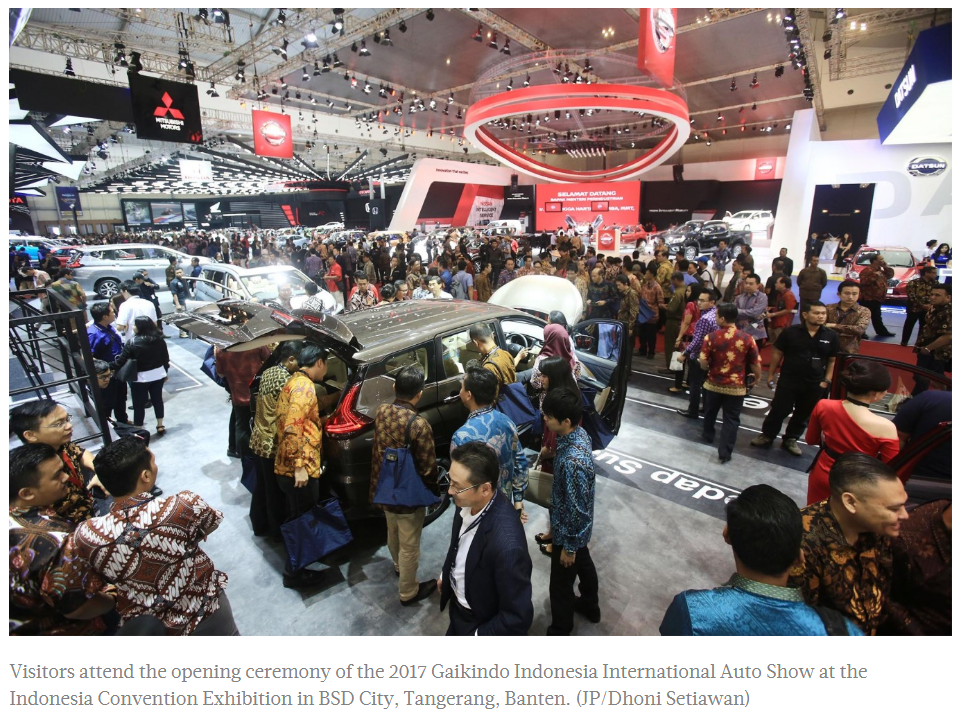Indonesia: Automakers slash car sales targets as spending power weakens
Weakening purchasing power following business disruptions caused by the COVID-19 pandemic has battered the country’s automotive industry, forcing carmakers to significantly lower their car sales targets this year.
The Association of Indonesian Automotive Manufacturers (Gaikindo) cut its domestic car sales target this year by 40 percent to just 600,000 units as the government’s large-scale social restrictions (PSBB) and cooling economic outlook were expected to hit demand. According to the association, more than 1 million cars were sold last year.
The forecast was made as April’s car sales nosedived by more than 90 percent year-on-year (yoy) to 7,871 units, according to data compiled by diversified conglomerate PT Astra International. Car sales are an indicator of household spending growth.
“April’s wholesales number is the worst we’ve seen in decades. With the PSBB imposed across Indonesia, we assume that it will only get worse in May,” Gaikindo chairman Yohannes Nangoi said during a discussion held by marketing firm MarkPlus on Friday.
Gaikindo also slashed Indonesia’s car export target to 175,000 units in 2020 from the initial target of 350,000 to 400,000 units, he added.
Four provinces and 26 regencies and cities across the archipelago have implemented the PSBB. There have been more than 18,000 cases of COVID-19 and at least 1,191 deaths since the government announced the first two cases in early March. The social restrictions have disrupted business activity and hit people’s purchasing power as millions have lost their jobs.
Consumer spending, which accounts for more than a half of the country’s GDP, grew just 2.84 percent yoy in the first quarter, far less than last year’s growth of 5.01 percent. Fitch Solutions expected private consumption to contract 1.5 percent yoy in 2020 from a previous forecast growth of 1.2 percent following 5 percent growth in 2019.
Indonesia’s consumer confidence index nosedived to its lowest level in 12 years as consumers expressed pessimism amid the pandemic, according to a recent Bank Indonesia (BI) survey.
Yohannes said the health crisis threatened 1.5 million automotive industry workers in the country, though Gaikindo members agreed to avoid layoffs.
“We also recently had talks with Industry Ministry officials and they asked us to prevent permanent closures of all factories as it could rattle the country’s auto industry image,” he said.
“We will only use around 50 percent of our capacity […] and currently carmakers are focusing on utilizing their production capacity.”
Institute for Development of Economics and Finance (Indef) economist Andry Satrio Nugroho told The Jakarta Post on Monday that the slumping domestic car sales could hit the country’s GDP and trigger ripple effects on other industries in the supply chain.
“The auto industry is a part of Indonesia’s strategic industry as it makes up around 1.8 percent of the country’s GDP,” he said, adding that the commercial sector of the automotive industry also chipped in significantly to the economy.
“Closely linked sectors, such as car assembly plants and dealerships, will be affected despite the fact that the industry is still relying heavily on imported intermediate goods,” he said.
Automotive industry expert Bebin Djuana said he expected demand for domestic cars to remain low throughout the year as the pandemic hit the economy.
“The sales recovery will be gradual, rather than a V-shaped spike, because the purchasing power of average Indonesians is greatly affected by the pandemic,” he told the Post in a separate interview on Monday.
Moody’s Investors Service wrote in a research note on May 13 that it expected the economic impact of the coronavirus outbreak to spark steep declines of at least 30 percent in auto unit sales in Indonesia with sales to rebound by 15 to 20 percent in 2021 off a lower base.
Yohannes said the weakening purchasing power would affect demand in the future as people now were focusing on fulfilling their basic needs.
The association had asked the government for additional stimulus, including a vehicle tax rate cut of 30 to 50 percent, relaxations to the import and export permit extension process and penalty fee waivers for factories that underused their electricity and gas quotas.
“The automotive industry is currently suffering and we hope the government pays special attention to us after the COVID-19 pandemic ends,” Johannes said.
Source: https://www.thejakartapost.com/news/2020/05/18/automakers-slash-car-sales-targets-as-spending-power-weakens.html


 Thailand
Thailand




